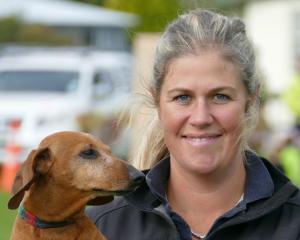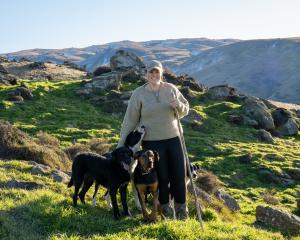

He and his wife, Kellie, and farm manager Grant Bezett hosted about 100 people on farm Auldamor at a field day for the 2023 Ballance Farm Environment Awards Otago regional supreme winners.
Mr Nichol is the fifth generation of his family to farm on the Strath Taieri for 150 years.
On Auldamor, they breed and finish sheep, about 4500 Romney Texel ewes plus replacements and a terminal flock, and breed cattle, a mix of Angus and Herefords, and have some carbon and production forestry.
His parents bought the farm, now known as Auldamor, during their tenure. He leased the freehold block from 2007, purchased the stock and bought the farm outright in 2010.
They had some pretty tough years from taking over to 2016, including facing an average rainfall of about 450mm.
"Over this period I was losing confidence in my ability and was disgruntled in the direction of the farming business. I was lacking enjoyment and wondered if this was for me."
He had been to university and believed he knew a bit, but realised he did not have any real control over the farming operation and its performance was fluctuating.
"We were always tight for feed and it was a stressful way to farm."
After some sit downs with his wife, he realised he did not need to farm in isolation to be a successful farmer.
"We needed a team."
He reached out to his friend, Greg McSkimming, for guidance, who at the time was involved with Farm IQ.
"This was a turning point for us."
A farm focus group was set up with a mix of mentors, consultants and mates.
"We had a really good look at our farming systems."
He began to understand the importance of planning, monitoring and measuring and being accountable for decisions and actions on farm and the value of having a great team involved with your business.
"With the changes made we started to gain control."
The confidence and enjoyment returned and the farm performance started to rise.
"That lay foundations for the farming system we have today."
The couple started their family in 2018, a time when he was struggling with his own physical health.
"My body was wearing out quicker than I wanted."
After visiting a medical specialist, he made the call in late 2019 to step back from day-to-day farming, the same year they had leased another 522ha block from a neighbour.
They employed farm manager Grant Bezett in March 2020, Mr Nichol said.
"We are very happy to have Grant with his knowledge and experience to run the farm."
Adjusting to a different way of life was tough for Mr Nichol.
Despite the change, he remained passionate about the industry and wanted to find a way to support other farming businesses.
After plenty of professional development and study he launched his farm consultancy business, Farmlife Advisory, in late 2021, specialising in technical support, financial analysis and environmental planning for sheep and beef farming operations.
On Auldamor they measured success using a concept of the "triple bottom line".
The triple bottom line was a framework with three parts — economic, environmental and social, or profit, planet and people.
The framework was used to evaluate their performance, future projects and endeavours, and create greater business value.
Considerations in the framework included financial performance of the business, the impact on the natural environment and the treatment of staff and contractors.
Ways to monitor the progress on farm includes creating feed budgets and crop sampling, soil testing and ecological monitoring of waterways and biodiversity and weighing and condition scoring stock.
The ewe scanning average on Auldamor was 178% and the lambing percentage was 145%.
Goals on the farm included increasing total lambing weight for the ewes and hoggets by maintaining scanning at 180%, increasing lambing to 150%, reduce scanning losses and maintain ewes at condition score 3-4 year round.
The goals would be achieved by actions including improving feeding six weeks out from lambing, reducing ewes lambing on exposed areas, improving covers at lambing and changing ram breed for hoggets.
Developments during their tenure include fencing about 2km of waterways or critical source areas.
The plan was to fence another 2km this year to integrate into forestry blocks.
More than 2km of shelterbelts had been planted in the past 8 years.
A 13ha block had recently been approved for a QEII covenant.
An awards judge said in the environmental space, the Nichols keep "ahead of the game" and "lead not follow".
At a glance
Auldamor sheep and beef farm
Ownership structure: 976ha freehold and 522ha lease
Farm area: 1498ha total, 1465ha effective; 499ha gullies, 914ha cultivatable, 13ha QEII block, 34ha tree blocks, with another 17ha to be planted this season, eventually planting up to 10% of freehold farm in Emissions Trading Scheme suitable blocks
Climate: Long cold winters, dry summers and rainfall between 550mm and 600mm
Soil type: 55% brown and 45% Pallic
Topography: A mix of rolling to steep faces and about 80% north-facing
Altitude: Between 370m and 720m above sea level
At a glance
Stock wintered on Auldamor
Mixed-age ewes: 3000
Two-tooth ewes: 1500
Hoggets mated: 1500
Rams: 80
Cattle: 290 mixed age cows and four bulls














